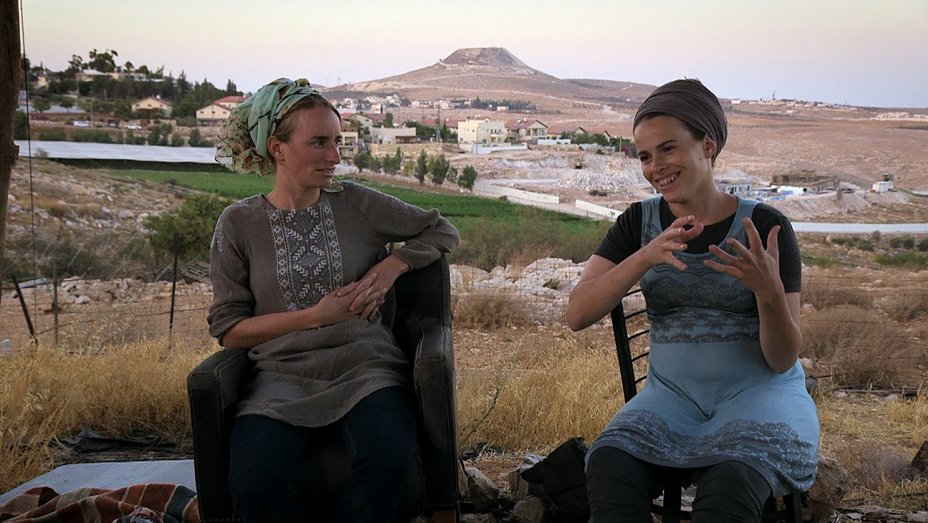WEST OF THE JORDAN RIVER
Kino Lorber
Director: Amos Gitai
Screenwriter: Amos Gitai
Cinematographers: Oded Kirma, Eitan Hai, Vladimir Truchovski
Cast: Amos Gitai, Yitzhak Rabin, Tzipi Lipni, Tzipi Hotovely, groups of Muslims and Jews
Screened at: Critics’ link, NYC, 1/9/18
Opens: January 26 at New York’s Quad Cinema
Toward the conclusion of Amos Gitai’s documentary a carousel is spinning, but while its few inhabitants appear to be having a good time, the carousel exists here as a symbol. Talks between Israelis and Palestinians have been going round and round, a veritable merry-go-roundelay, just like the subjects in Arthur Schnitzler’s play “Der Reigen,” also known as “La Ronde.” Peace talks between the two sides have occasionally appeared to make progress, such as when Bill Clinton brought Yasser Arafat together with Menachim Begin—and the two adversaries actually shook hands. In another instance, an extremist Jew was so fearful that Israeli Prime Minister Rabin was on the verge of agreeing to a settlement that Rabin was killed to the cheers of other extremist Jews. Killed by a fellow Jew!
Here we are today, the sides still apart, no talks scheduled between Abu Mazen on the Palestinian side and Bibi Netanyahu on the Israeli’s. But not to worry: talks will resume, and a peace agreement will remain somewhere over the horizon. “West of the Jordan River” is another talk-fest, this one initiated by Amos Gitai (Gitai is a Hebrew translation of his parents’ name Weinraub), an Israeli filmmaker with 62 credits, lots of shorts, the last one being “Rabin: The Last Day” about the aforementioned Israeli leader’s assassination.
Not that the doc will lead to peace and a joint chorus of Kumbaya, but it’s an entertaining enough film, some, but not I, would say hopeful filled with mournful music (that I could do without) between each segment of chats with the locals. Surprisingly Gitai knows his own language, Hebrew, and also English, plus some French for having lived in voluntary exile in France.
But when he converses with Arabic-speaking people, he needs a translator. He probably need not worry this time
that his movie will inflame his fellow Israelis and force him to bolt to France as he did in 1982 after screening his doc
“Field Diary,” which found Gitai chatting in Nablus and surrounding areas, making time to hear a fellow under house
arrest. His leftist credentials never wavered, and there’s an implication even with this current film that he belives Israel’s
intransigence is the principal reason for instability between the two peoples.
“West of the Jordan River” is not as antagonistic. He does not goad Israeli soldiers with his camera as he did in “Field Diary.” And the folks with whom he chats are friendly, though some get pretty excited even though they do not curse the Israelis. Not all the action takes place West of the Jordan, as much of the dialogue is within Israel proper and a few clips near the beginning in Gaza. In Gaza, which the media portray as the home of the most militant faction against “Zionists,” people lean into Gitai’s van to say that they want to work in Israel; that they can build their community just as the Israelis built their land, if only they could have the freedom of their own independent nation. One gets the impression that these Arabs are told that if they moderated their language and even sounded conciliatory, they would have the most chance of making the final cut of the film.
The trouble with everything here is that while Prime Minister Rabin is interviewed, suggesting that he is not the pacifist hippy that some made him out to be, and while a more militant deputy, Tzipi Hotoveli, is on camera with a mystical explanation of the land, most of the talk is with ordinary people. Ordinary people do not make peace or war with the exception of revolutions that succeed by winning the support of the armed forces. It’s all well and good to sit around like the members of Breaking the Silence, a left-leaning activist group that conveys information on life in the occupied territories; and with Arab and Jewish women forming a support group citing how sons on both their sides lost their lives. But nothing will get done until those in power can carve a peace with definite borders—less likely than ever, Gitai believes, because a “very reactionary” government under Netanyahu has held power for ages with large support, the prime minister having said during a recent election campaign that he has no use for a two-state solution.
Again blaming his own people for the obstinacy, Gitai interviews a pair of settlers, people living on ground that Arabs vociferously claim as their own. We hear one settler, a young woman who was stabbed by an Arab resident living nearby, state that the land does not belong to anybody; it belongs to God. And in the Bible, God promised to rent all the disputed land to the Jews. Who can argue with God? Probably the Muslims, whose own Koran probably makes no such promise. Gitai spends the most interesting minutes with an Arab boy of about ten who says that when he grows up, he wants to be…no, not a fireman or a cop or an astronaut, but a martyr. Asked whether he likes life, the boy responds, yeah, but martyrdom is better. Does this say anything about what the upcoming generation might do absent a peace?
Unrated. 84 minutes. © Harvey Karten, Member, New York Film Critics Online
Story – B-
Acting – B
Technical – B+
Overall – B







